-

新人教版高中英语必修3Unit 1 Festivals and Celebrations-Reading and Thinking教学设计
The topic of this part is “Discover the reasons for festivals and celebrations.The Listening & Speaking & Talking part aims at talking about the experiences and feelings or emotions about the festivals and celebrations. This section aims at detecting the reason why the people celebrate the festivals, the time, the places, the types and the way of celebrations. It also explains why some traditions in the old celebrations are disappearing, like the firecrackers in the big cities and some new things are appearing like the prosperity of business or commerce. 1. Students can talk about what festivals they know and the reasons and the way of celebrating them.2. Students should learn the reading skills such as the headline and get the topic sentences, the structures of articles.3. Students can understand the past, the present situation of some festival around the world and why there are some changes about them. 4. Students can have the international awareness about the festivals.1. Students should learn the reading skills such as the headline and get the topic sentences, the structures of articles.2. Students can understand the past, the present situation of some festival around the world and why there are some changes about them.Step 1 Lead in---Small talkWhat festival do you like best ? Why ?I like the Spring Festivals because I can set off the fireworks, receive the lucky money and enjoy the Gala with my families.Step 2 Before reading---Pair workWhy do people celebrate different festivals ?The Spring Festivals is to celebrate the end of winter and the coming of spring and new life.The Mid-autumn Day is to celebrate the harvest and admire the moon.

新人教版高中英语必修3Unit 1 Festivals and Celebrations-Reading for writing教学设计二
Step 3 Analyzing article structureActivity 31. Teachers raise questions to guide students to analyze the chapter structure of this diary and think about how to describe the festival experience. (1)What should be included in the opening/body/closing paragraph(s)?(2)How did the writer arrange his/her ideas?(3)What kind of interesting details did the writer describe?(4)How did the writer describe his/her feelings/emotions during the event?2. Students read and compare the three sentence patterns in activity 2. Try to rewrite the first paragraph of the diary with these three sentence patterns. After that, students exchange corrections with their partners. Such as:●This was my first time spending three days experiencing the Naadam Festival in China’s Inner Mongolia Autonomous Region and it was an enjoyable and exciting experience. ●I'll never forget my experience at the Naadam Festival because it was my first time to watch the exciting Mongolian games of horse racing, wrestling, and archery so closely. ●I'll always remember my first experience at the Naadam Festival in China’s Inner Mongolia Autonomous Region because it was so amazing to spend three days witnessing a grand Mongolian ceremony. Step 4 Accumulation of statementsActivity 41. Ask the students to read the diary again. Look for sentences that express feelings and emotions, especially those with the -ing form and the past participle. Such as:● …horse racing, wrestling, and archery, which are all so exciting to watch. ● some amazing performances● I was surprised to see…● I was a little worried about. . . ● feeling really tiredOther emotional statements:●I absolutely enjoyed the archery, too, but the horse races were my favourite part. ●I'm finally back home now, feeling really tired, but celebrating Naadam with my friend was totally worth it. ●He invited me back for the winter to stay in a traditional Mongolian tent and cat hot pot. I can’t wait!2. In addition to the use of the -ing form and the past participle, the teacher should guide the students in the appreciation of these statements, ask them to memorize them, and encourage them to use them reasonably in writing practice.

新人教版高中英语必修3Unit 2 Morals and Virtues-Discovering Useful Structure教学设计
1. 表示时间。Hearing these stories, I’m skeptical about the place. = When I heard these stories. . . 2. 表示原因。Not knowing his address, I can’t send this book to him. = Because/Since/As I don’t know his address. . . 3. 表示结果。His father died, leaving him a lot of money. =. . . and left him a lot of money4. 表示条件。Going straight down the road, you will find the department store. = If you go straight down the road. . . 5. 表示让步。Being tired, they went on working. =Although they were tired. . . 6. 表示行为方式、伴随情况或补充说明。He lay on the grass, staring at the sky for a long time. =. . . and stared at the sky for a long time注意:非谓语动词作状语时, 如所提供的动词不能和句子中的主语保持一致, 动词-ing形式必须有自己的逻辑主语, 通常由名词或代词来担任, 这就是独立主格结构。The last bus having gone, we had to walk home. (having gone的逻辑主语是the last bus, 而不是we)Weather permitting, the football match will be played on Friday. (permitting的逻辑主语是time, 而不是the football match)Step 7 Practice1. ________(study) hard, you are sure to get first prize. 2. People use plastic in their daily life, _______(leave) large amounts of waste. 3. ________(work) hard at your lessons, you are to succeed. 4. The old man, ____________(work) abroad for twenty years, is on the way back to his motherland. 5. ______________(finish) his homework, he was playing on the playground. Answers: 1. Studying 2. leaving 3. Working 4.having worked 5. Having finishedStep 8 HomeworkFinish the homework on Page 22.

新人教版高中英语必修3Unit 2 Morals and Virtues-Reading for Writing教学设计
1. 这个寓言是一个关于一位国王古寓言。 The fable is an old fable about a king.2.作者用这个故事让读者对于社区的问题负有个人责任的必要印象深刻。The author used the story to impress upon readers with the need to take personal responsibility for problems in the community.3. 这个故事十分成功的实现了它的目的。The story was quite successful in achieving its purpose.Step 7 WritingPlease write a review of the story according the outline above.The fable is an old fable about a king who thought his people are lazy, so he put a large stone in the middle of the road and hides and waited to see if anyone will try to move it.The author used this story to impress upon readers with the need to take personal responsibility for problems in the community. The story was quite successful in achieving its purpose, and I liked it because it had a clear moral.However, while the moral of the story is clear, the actions of the king seemed pointless to me, because none of the characters in the story learnt anything. For this reason, I think there are better stories that can be used to impress upon people with the need for personal responsibility.Step 8 Pair workExchange drafts with a partner. Use this checklist to help your partner revise his/her draft.1. Does the writer give a short description of the story ?2. Does the description include the most important details of the story ?3. Does the writer give his or her opinion about the character or their actions ?4. Is the review well-organised ? 5. Does the writer use the -ing form as the adverbial correctly in the writing ?6. Are there any grammar, spelling, or punctuation errors ?Step 9 HomeworkPut up your revised draft in the classroom or read it to your class.

新人教版高中英语必修3Unit 4 Space Exploration-Listening&Speaking&Talking教学设计一
Listening and Speaking introduces the topic of “talking about how to become an astronaut”. This period is aimed to inform students some details about the requirements of being an astronaut. Students can be motivated and inspired by the astronauts. Teachers ought to encourage students to learn from them and let them aim high and dream big.Listening and Talking introduces the theme of "talk about life in space". This part also informs students more details about life in space and can inspire students to be curious about this job. 1. Guide students to listen for numbers concerning dates, years and ages etc2. Cultivate students' ability to talk about how to become an astronaut and life in space ; 3. Instruct students to use functional sentences of the dialogue such as “ first of all, I am not sure, so what might be .. I guess.. I wonder…I am curious…)appropriately.1. Guide students to understand the content of listening texts in terms of the whole and key details; 2. Cultivate students' ability to guess the meaning of words in listening; discuss with their peers how to become a qualified astronaut and describe the life in space.Part 1: Listening and SpeakingStep 1: Lead inPredictionThe teacher can ask students to predict what the listening text is about by looking at the pictures.About how to become an astronaut./the requirements of an astronautStep 2: Then, play the radio which is about an interview a. And after finishing listening for the first time, the students need to solve the following tasks.

新人教版高中英语必修3Unit 4 Space Exploration-Reading and Thinking教学设计二
The theme of this unit focuses on “space exploration.” Students will learn about the training and experience needed to become an astronaut. The text is mainly about the development of space exploration. On the one hand, the text helps students to have a good understanding about the great feats humans have achieved, on the other hand, they will further understand the contributions that we Chinese have achieved, and feel confident and proud about our homeland and strengthen their love for our country. The teacher should instruct students to aim high and study harder to make great progress in the space career if possible.1. Read about the development and value of space exploration.2. Explore the mysteries of the universe and the achievements in space exploration.3. Skillfully use the vocabulary of this text to cultivate self-study ability 4. Develop cooperative learning ability through discussion.1. Enable the Ss to talk about the development and value of space exploration.2. Guide the Ss to summarize the main idea of each paragraph as well as the main idea of the text.3. Help Ss comprehend the main reasons for space exploration. Multi-media, textbook, notebooks.Step 1: Warming up and predictionLook at the title and the pictures of the text and predict what the text will be about?2. What are the main reasons for space exploration?

新人教版高中英语必修3Unit 4 Space Exploration-Reading for Writing教学设计二
⑦在我看来, 探索太空是值得的。As far as I am concerned, it is worthwhile to explore the space.Step 10 Writing---draftRecently, students in our class have had heated a discussion on whether space is worth exploring. Students hold different ideas about it.30% of us think space exploration is not worthwhile. They think space is too far away from us and our daily life and is a waste of money. And the money spent on space exploration can be used to solve the earth’s problems such as starvation and pollution.On the other hand,70% think space is worth exploring because we have benefited a lot from it,such as using satellites for communication and weather forecast. What’s more,with further space research,we may solve the population problem by moving to other planets one day. Also,space research will enable us to find new sources to solve the problem of energy shortages on the earth.As far as I am concerned, it is worthwhile to explore the space. Not only can it promote the development of society but also enrich our life. Step 11 Pair workExchange drafts with a partner. Use this checklist to help your partner revise his/her draft.1.Does the writer explain why he/she changed/wanted to change?2.Does the writer tell how the changes have improved or will improve his/her life?3.Is the text well-organised?4.Does the writer use words and expressions to show similarities and differences?5.Are there any grammar or spelling errors?6.Does the writer use correct punctuation?

新人教版高中英语必修3Unit 5 The Value of Money-Listening &Speaking&Talking教学设计
4. A:We’d like to have someone to say a word at the beginning to welcome the group.B:↙Who?A:We thought that you or Dr.Johnson might do it.B用降调说Who,其意思是问,对方想让谁在开场时致欢迎词。Step 6 Pronunciation---Practice1. Listen to the short conversation and mark the intonation with ↗, ↙ or ↙, ↗. Then discuss with a partner what they intend to convey by using different intonation.Owner: You know what ?↗ It’s a million-pound bank note↙.Waiter 1: Really ?↗(question)Waiter 2: Really !↙(unbelievable and surprised)Waiter 3: Really ?!↙↗(first question then surprised)2. Listen to the conversations. Underline the parts that are stressed and mark the intonation. Then talk about the implied meanings of the responses with different intonations. Listen again and repeat.1) Henry: It’s a nice suit.Owner: Oh, it’s perfect!↙(The intonation means it is very suitable for Henry.)2) Henry: Well, that’s very kind of you.Owner: Kind, sir ?↗(what you said is not right) No, it’s kind of you. You must come whenever you want and have whatever you like. Just having you sit here is a great honour !!↙(welcome you to come again)3)Henry:Well, to be honest, I have none. Oliver:(happily) What luck!(excited) Brother↗, what luck!↙(It means “Didn’t you hear it?”)Henry: Well, it may seem lucky to you but not to me!↗(angry) If this is your idea of some kind of joke, I don’t think it’s very funny. Now if you’ll excuse me, I ought to be on my way.↙(If so, I would leave.)Roderick: Please don’t go↙...(hope Henry can wait for a moment)Part B Viewing and Talking---Describe people’s changing attitudes in a film clipStep 1 Before-listening---Tell the filmYou are going to watch part of the film The Million Pound Bank Note. Look at these photos and guess what happens in the film.

新人教版高中英语必修3Unit 5 The Value of Money-Reading and Thinking教学设计一
Everybody wants to get wealth.In today’s material world,making money or becoming wealthy symbolizes a person’s success and capability. Many people just make every effort, pay any price to attain greater wealth. With money,they can buy nice, large apartments in nice neighborhood. With money they can own luxurious cars. Wealth seems to bring all happiness in life.But is wealth the only road to happiness? Not really. There are many things in the world, which are beyond the means of money, such as friendship, love, health and knowledge. People are so preoccupied with struggling for money that they have no time or would not take the time to form or maintain friendship. What happiness can they feel living as lonely miserable creatures without love or friends in the world even if they accumulate tremendous wealth?In my opinion, people can’t do anything without money, but money is not everything. What money will bring you depends on your personal belief and goal in life. If you are kind enough to help others, especially the poor, money is a good thing to you. With it, you can do much more for the benefit of people and your country, and it will add to your own happiness. If you want money just for your own needs, you’ll never be satisfied or happy. In a word,you should have money spent for more people. Only then can money be the source of your happiness.Step 8 Homework4 students in a group, one acts Roderick, one Oliver, one servant and the fourth one acts Henry Adams, then listen to the tape, pay more attention to the difference between American English and British English in pronunciation, stress, tone.

新人教版高中英语选修2Unit 1 Science and Scientists-Learning about Language教学设计
Step 7: complete the discourse according to the grammar rules.Cholera used to be one of the most 1.__________ (fear) diseases in the world. In the early 19th century, _2_________ an outbreak of cholera hit Europe, millions of people died. But neither its cause, 3__________ its cure was understood. A British doctor, John Snow, wanted to solve the problem and he knew that cholera would not be controlled _4_________ its cause was found. In general, there were two contradictory theories 5 __________ explained how cholera spread. The first suggested that bad air caused the disease. The second was that cholera was caused by an _6_________(infect) from germs in food or water. John Snow thought that the second theory was correct but he needed proof. So when another outbreak of cholera hit London in 1854, he began to investigate. Later, with all the evidence he _7_________ (gather), John Snow was able to announce that the pump water carried cholera germs. Therefore, he had the handle of the pump _8_________ (remove) so that it couldn't be used. Through his intervention,the disease was stopped in its tracks. What is more, John Snow found that some companies sold water from the River Thames that __9__________________ (pollute) by raw waste. The people who drank this water were much more likely _10_________ (get) cholera than those who drank pure or boiled water. Through John Snow's efforts, the _11_________ (threaten) of cholera around the world saw a substantial increase. Keys: 1.feared 2.when 3. nor 4.unless 5.that/which 6.infection 7.had gathered 8.removed 9.was polluted 10.to get 11. threat

新人教版高中英语选修2Unit 2 Bridging Cultures-Discovering useful structures教学设计
The grammar of this unit is designed to review noun clauses. Sentences that use nouns in a sentence are called noun clauses. Nominal clauses can act as subject, object, predicate, appositive and other components in compound sentences. According to the above-mentioned different grammatical functions, nominal clauses are divided into subject clause, object clause, predicate clause and appositive clause. In this unit, we will review the three kinds of nominal clauses. Appositive clauses are not required to be mastered in the optional compulsory stage, so they are not involved.1. Guide the students to judge the compound sentences and determine the composition of the clauses in the sentence.2. Instruct students to try to learn grammar by generalizing grammar rules, controlling written practice, and semi-open oral output.3. Inspire the students to systematize the function and usage of noun clause1.Instruct students to try to learn grammar by generalizing grammar rules, controlling written practice, and semi-open oral output.2.Inspire the students to systematize the function and usage of noun clauseStep1: The teacher ask studetns to find out more nominal clauses from the reading passage and udnerline the nominal clauses.
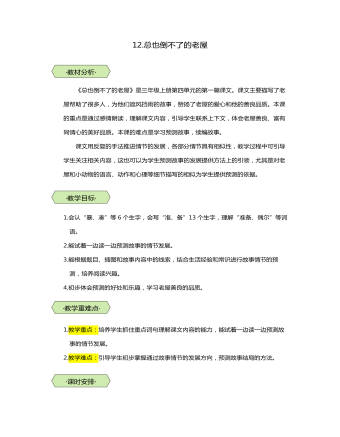
统编版三年级语文上第12课总也倒不了的老屋教学设计教案
《总也倒不了的老屋》是三年级上册第四单元的第一篇课文。课文主要描写了老屋帮助了很多人,为他们遮风挡雨的故事,赞扬了老屋的爱心和他的善良品质。本课的重点是通过感情朗读,理解课文内容,引导学生联系上下文,体会老屋善良、富有同情心的美好品质。本课的难点是学习预测故事,续编故事。课文用反复的手法推进情节的发展,各部分情节具有相似性,教学过程中可引导学生关注相关内容,这也可以为学生预测故事的发展提供方法上的引领,尤其是对老屋和小动物的语言、动作和心理等细节描写的相似为学生提供预测的依据。 1.会认“暴、凑”等6个生字,会写“准、备”13个生字,理解“准备、偶尔”等词语。2.能试着一边读一边预测故事的情节发展。3.能根据题目、插图和故事内容中的线索,结合生活经验和常识进行故事情节的预测,培养阅读兴趣。4.初步体会预测的好处和乐趣,学习老屋善良的品质。 1.教学重点:培养学生抓住重点词句理解课文内容的能力,能试着一边读一边预测故事的情节发展。2.教学难点:引导学生初步掌握通过故事情节的发展方向,预测故事结局的方法。 2课时
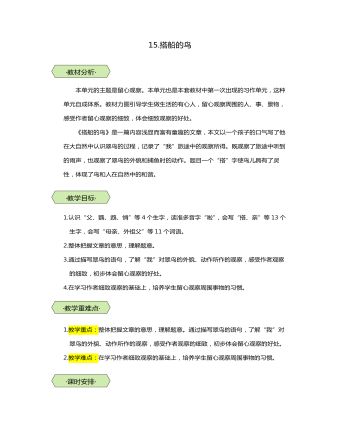
统编版三年级语文上第15课搭船的鸟教学设计教案
本单元的主题是留心观察。本单元也是本套教材中第一次出现的习作单元,这种单元自成体系。教材力图引导学生做生活的有心人,留心观察周围的人、事、景物,感受作者留心观察的细致,体会细致观察的好处。《搭船的鸟》是一篇内容浅显而富有童趣的文章,本文以一个孩子的口气写了他在大自然中认识翠鸟的过程,记录了“我”旅途中的观察所得。既观察了旅途中听到的雨声,也观察了翠鸟的外貌和捕鱼时的动作。题目一个“搭”字使鸟儿具有了灵性,体现了鸟和人在自然中的和谐。 1.认识“父、鹦、鹉、悄”等4个生字,读准多音字“啦”,会写“搭、亲”等13个生字,会写“母亲、外祖父”等11个词语。2.整体把握文章的意思,理解题意。3.通过描写翠鸟的语句,了解“我”对翠鸟的外貌、动作所作的观察,感受作者观察的细致,初步体会留心观察的好处。4.在学习作者细致观察的基础上,培养学生留心观察周围事物的习惯。 1.教学重点:整体把握文章的意思,理解题意。通过描写翠鸟的语句,了解“我”对翠鸟的外貌、动作所作的观察,感受作者观察的细致,初步体会留心观察的好处。2.教学难点:在学习作者细致观察的基础上,培养学生留心观察周围事物的习惯。 2课时
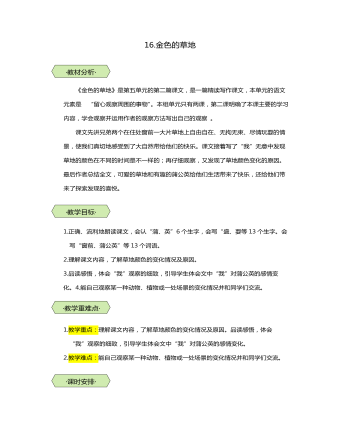
统编版三年级语文上第16课金色的草地教学设计教案
《金色的草地》是第五单元的第二篇课文,是一篇精读写作课文,本单元的语文元素是 “留心观察周围的事物”。本组单元只有两课,第二课明确了本课主要的学习内容,学会观察并运用作者的观察方法写出自己的观察。课文先讲兄弟两个在住处窗前一大片草地上自由自在、无拘无束、尽情玩耍的情景,使我们真切地感受到了大自然带给他们的快乐。课文接着写了“我”无意中发现草地的颜色在不同的时间是不一样的;再仔细观察,又发现了草地颜色变化的原因。最后作者总结全文,可爱的草地和有趣的蒲公英给他们生活带来了快乐,还给他们带来了探索发现的喜悦。 1.正确、流利地朗读课文,会认“蒲、英”6个生字,会写“盛、耍等13个生字。会写“窗前、蒲公英”等13个词语。2.理解课文内容,了解草地颜色的变化情况及原因。3.品读感悟,体会“我”观察的细致,引导学生体会文中“我”对蒲公英的感情变化。4.能自己观察某一种动物、植物或一处场景的变化情况并和同学们交流。 1.教学重点:理解课文内容,了解草地颜色的变化情况及原因。品读感悟,体会“我”观察的细致,引导学生体会文中“我”对蒲公英的感情变化。2.教学难点:能自己观察某一种动物、植物或一处场景的变化情况并和同学们交流。 2课时
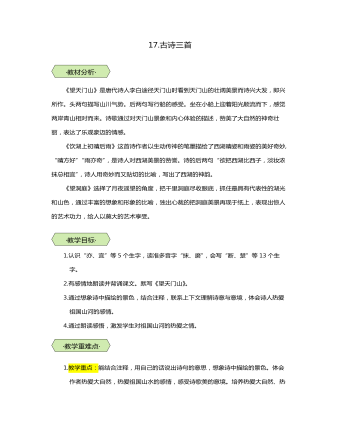
统编版三年级语文上第17课古诗三首教学设计教案
《望天门山》是唐代诗人李白途径天门山时看到天门山的壮阔美景而诗兴大发,即兴所作。头两句描写山川气势。后两句写行船的感受。坐在小船上迎着阳光顺流而下,感觉两岸青山相对而来。诗歌通过对天门山景象和内心体验的描述,赞美了大自然的神奇壮丽,表达了乐观豪迈的情感。《饮湖上初晴后雨》这首诗作者以生动传神的笔墨描绘了西湖晴姿和雨姿的美好奇妙,?“晴方好”“雨亦奇”,是诗人对西湖美景的赞誉。诗的后两句“欲把西湖比西子,淡妆浓抹总相宜”,诗人用奇妙而又贴切的比喻,写出了西湖的神韵。《望洞庭》选择了月夜遥望的角度,把千里洞庭尽收眼底,抓住最具有代表性的湖光和山色,通过丰富的想象和形象的比喻,独出心裁的把洞庭美景再现于纸上,表现出惊人的艺术功力,给人以莫大的艺术享受。 1.认识“亦、宜”等5个生字,读准多音字“抹、磨”,会写“断、楚”等13个生字。2.有感情地朗读并背诵课文。默写《望天门山》。3.通过想象诗中描绘的景色,结合注释,联系上下文理解诗意与意境,体会诗人热爱祖国山河的感情。4.通过朗读感悟,激发学生对祖国山河的热爱之情。 1.教学重点:能结合注释,用自己的话说出诗句的意思,想象诗中描绘的景色。体会作者热爱大自然,热爱祖国山水的感情,感受诗歌美的意境。培养热爱大自然、热爱祖国的情感。2.教学难点:体会诗文的内容,体会诗人的思想感情。 3课时
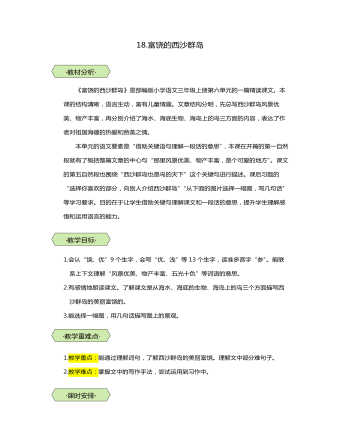
统编版三年级语文上第18课富饶的西沙群岛教学设计教案
《富饶的西沙群岛》是部编版小学语文三年级上册第六单元的一篇精读课文。本课的结构清晰,语言生动,富有儿童情趣。文章结构分明,先总写西沙群岛风景优美、物产丰富,再分别介绍了海水、海底生物、海岛上的鸟三方面的内容,表达了作者对祖国海疆的热爱和赞美之情。本单元的语文要素是“借助关键语句理解一段话的意思”,本课在开篇的第一自然段就有了概括整篇文章的中心句“那里风景优美、物产丰富,是个可爱的地方”。课文的第五自然段也围绕“西沙群岛也是鸟的天下”这个关键句进行描述。课后习题的“选择你喜欢的部分,向别人介绍西沙群岛”“从下面的图片选择一幅图,写几句话”等学习要求。目的在于让学生借助关键句理解课文和一段话的意思,提升学生理解感悟和运用语言的能力。 1.会认“饶、优”9个生字,会写“优、浅”等13个生字,读准多音字“参”。能联系上下文理解“风景优美、物产丰富、五光十色”等词语的意思。2.有感情地朗读课文。了解课文是从海水、海底的生物、海岛上的鸟三个方面描写西沙群岛的美丽富饶的。3.能选择一幅图,用几句话描写图上的景观。 1.教学重点:能通过理解词句,了解西沙群岛的美丽富饶。理解文中部分难句子。2.教学难点:掌握文中的写作手法,尝试运用到习作中。 2课时
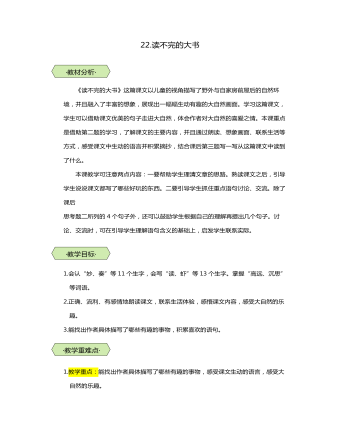
统编版三年级语文上第22课读不完的大书教学设计教案
《读不完的大书》这篇课文以儿童的视角描写了野外与自家房前屋后的自然环境,并且融入了丰富的想象,展现出一幅幅生动有趣的大自然画面。学习这篇课文,学生可以借助课文优美的句子走进大自然,体会作者对大自然的喜爱之情。本课重点是借助第二题的学习,了解课文的主要内容,并且通过朗读、想象画面、联系生活等方式,感受课文中生动的语言并积累摘抄,结合课后第三题写一写从这篇课文中读到了什么。本课教学可注意两点内容:一要帮助学生理清文章的思路。熟读课文之后,引导学生说说课文都写了哪些好玩的东西。二要引导学生抓住重点语句讨论、交流。除了课后思考题二所列的4个句子外,还可以鼓励学生根据自己的理解再提出几个句子。讨论、交流时,可在引导学生理解语句含义的基础上,启发学生联系实际。 1.会认“妙、奏”等11个生字,会写“读、虾”等13个生字。掌握“高远、沉思”等词语。2.正确、流利、有感情地朗读课文,联系生活体验,感悟课文内容,感受大自然的乐趣。3.能找出作者具体描写了哪些有趣的事物,积累喜欢的语句。 1.教学重点:能找出作者具体描写了哪些有趣的事物,感受课文生动的语言,感受大自然的乐趣。2.教学难点:能简单地写出自己感受到的大自然的乐趣,并和同学交流。 2课时
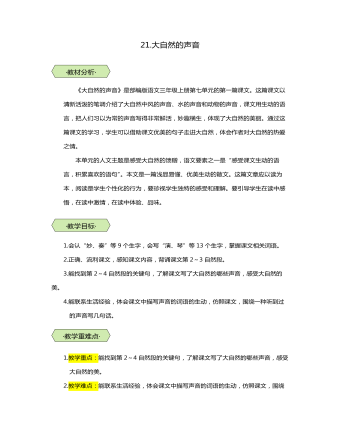
统编版三年级语文上第21课大自然的声音教学设计教案
《大自然的声音》是部编版语文三年级上册第七单元的第一篇课文。这篇课文以清新活泼的笔调介绍了大自然中风的声音、水的声音和动物的声音,课文用生动的语言,把人们习以为常的声音写得非常鲜活,妙趣横生,体现了大自然的美丽。通过这篇课文的学习,学生可以借助课文优美的句子走进大自然,体会作者对大自然的热爱之情。本单元的人文主题是感受大自然的馈赠,语文要素之一是“感受课文生动的语言,积累喜欢的语句”。本文是一篇浅显易懂、优美生动的散文。这篇文章应以读为本,阅读是学生个性化的行为,要珍视学生独特的感受和理解。要引导学生在读中感悟,在读中激情,在读中体验、品味。 1.会认“妙、奏”等9个生字,会写“演、琴”等13个生字,掌握课文相关词语。2.正确、流利课文,感知课文内容,背诵课文第2~3自然段。3.能找到第2~4自然段的关键句,了解课文写了大自然的哪些声音,感受大自然的美。4.能联系生活经验,体会课文中描写声音的词语的生动,仿照课文,围绕一种听到过的声音写几句话。 1.教学重点:能找到第2~4自然段的关键句,了解课文写了大自然的哪些声音,感受大自然的美。2.教学难点:能联系生活经验,体会课文中描写声音的词语的生动,仿照课文,围绕一种听到过的声音写几句话。 2课时
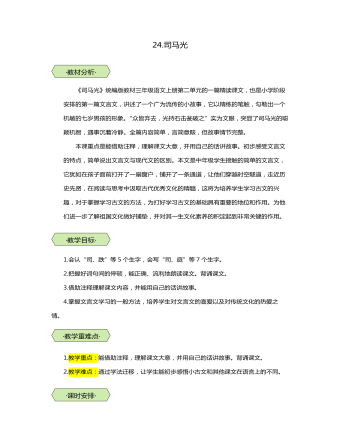
统编版三年级语文上第24课司马光教学设计教案
《司马光》统编版教材三年级语文上册第二单元的一篇精读课文,也是小学阶段安排的第一篇文言文,讲述了一个广为流传的小故事,它以精练的笔触,勾勒出一个机敏的七岁男孩的形象。“众皆弃去,光持石击瓮破之”实为文眼,突显了司马光的聪颖机智,遇事沉着冷静。全篇内容简单,言简意赅,但故事情节完整。本课重点是能借助注释,理解课文大意,并用自己的话讲故事。初步感受文言文的特点,简单说出文言文与现代文的区别。本文是中年级学生接触的简单的文言文,它犹如在孩子面前打开了一扇窗户,铺开了一条通道,让他们穿越时空隧道,走近历史先贤,在阅读与思考中汲取古代优秀文化的精髓,这将为培养学生学习古文的兴趣,对于掌握学习古文的方法,为打好学习古文的基础具有重要的地位和作用。为他们进一步了解祖国文化做好铺垫,并对其一生文化素养的积淀起到非常关键的作用。 1.会认“司、跌”等5个生字,会写“司、庭”等7个生字。2.把握好词句间的停顿,能正确、流利地朗读课文。背诵课文。3.借助注释理解课文内容,并能用自己的话讲故事。4.掌握文言文学习的一般方法,培养学生对文言文的喜爱以及对传统文化的热爱之情。 1.教学重点:能借助注释,理解课文大意,并用自己的话讲故事。背诵课文。2.教学难点:通过学法迁移,让学生能初步感悟小古文和其他课文在语言上的不同。 2课时
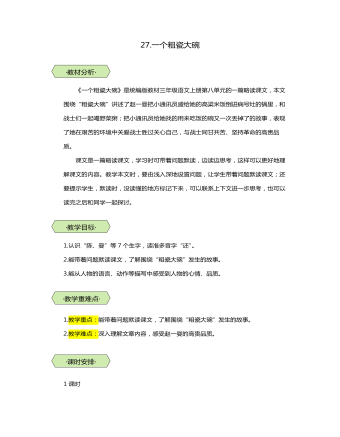
统编版三年级语文上第27课一个粗瓷大碗教学设计教案
《一个粗瓷大碗》是统编版教材三年级语文上册第八单元的一篇略读课文,本文围绕“粗瓷大碗”讲述了赵一曼把小通讯员盛给她的高粱米饭倒进病号灶的锅里,和战士们一起喝野菜粥;把小通讯员给她找的用来吃饭的碗又一次丢掉了的故事,表现了她在艰苦的环境中关爱战士胜过关心自己,与战士同甘共苦、坚持革命的高贵品质。课文是一篇略读课文,学习时可带着问题默读,边读边思考,这样可以更好地理解课文的内容。教学本文时,要由浅入深地设置问题,让学生带着问题默读课文;还要提示学生,默读时,没读懂的地方标记下来,可以联系上下文进一步思考,也可以读完之后和同学一起探讨。 1.认识“陈、曼”等7个生字,读准多音字“还”。2.能带着问题默读课文,了解围绕“粗瓷大碗”发生的故事。3.能从人物的语言、动作等描写中感受到人物的心情、品质。 1.教学重点:能带着问题默读课文,了解围绕“粗瓷大碗”发生的故事。2.教学难点:深入理解文章内容,感受赵一曼的高贵品质。 1课时

